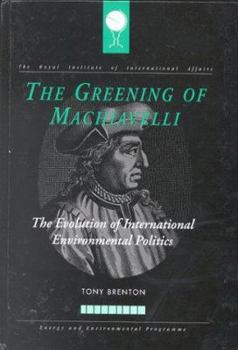Greening of Machiavelli: The Evolution of International Environmental Politics
Select Format
Select Condition 
Book Overview
This survey analyzes the last 25 years of international negotiation on environmental issues. Covering the Stockholm Conference of 1972 and the subsequent establishment of the United Nations... This description may be from another edition of this product.
Format:Paperback
Language:English
ISBN:1853832111
ISBN13:9781853832116
Release Date:June 1994
Publisher:Royal Institute of International Affairs
Length:282 Pages
Weight:0.88 lbs.
Dimensions:1.0" x 5.8" x 8.3"
Customer Reviews
2 ratings
Praise
Published by Thriftbooks.com User , 21 years ago
This is a truly inspired book with a truly inspired author, Tony Brenton who has a long and interesting history in the Foreign office and has just recently ended his 6 month term as charge d'affaires in Washington DC throughout the Iraq crisis he has been guiding us. The book is a perfect balance as an insider he has awarded us with information we would otherwise not find, for many universities this book is on the enviromental politics reading list and it deserves to be there. An accomplished novel that was written in the depths of Massachusetts America surrounded by the bustle of his family. He should be commended for his gift to society in both his career and this book.
Thoroughly comprehensive
Published by Thriftbooks.com User , 22 years ago
With seven years of experience dealing with environmental affairs for the UK Foreign Commonwealth Office and having served as a British delegate in the largest environmental conference of all time, the Rio Earth Summit, Tony Brenton attempts to tell the story of environmentalism. Mr. Brenton defines his environmental view as a `light green', making him a modern environmentalist. His optimistic views enable him to tell the intricate chronology of what many call a hopeless situation. In The Greening of Machiavelli: The Evolution of International Environmental Politics, Tony Brenton sites the modern definition of environment and ecology to have emerged in the early 1960's. Although resource conservation and wildlife preservation in the US and UK were popular causes beginning in the late 19th Century, they were not issues championed by the masses. The environment was brought to the forefront when, concerns over air pollution in the early 1960's combined with the 1962 American bestseller, Silver Spring exposed the dangers of pesticide use. When in 1967, the oil tanker, Torrey Canyon ran aground, causing the largest oil spill of all time; the developed world was ripe and ready to champion this issue. Mr. Brenton points out that it was members of the `new left political movement' that were the most vocal and staunchest supporters of the environmental movement. The post-World War II Western economic boon led to the shift from consumption to a focus on quality of life. The emergence of scientific studies with apocalyptic predictions as well as a string of environmental disasters all fed into the newly established sensationalist media. Public hysteria turned the ears of "sympathetic politicians". The Western influenced United Nations saw the need to tackle the issue. In 1972, United Nations Stockholm Conference was convened. The Conference was to deal with issues surrounding pollution, and rapid population growth. It was during the Conference that the gulf between the developed and developing world's perceptions of the environmental situation came to light. Developing nations were adamantly opposed to any regulations which could hinder their economic growth. Developed nations saw the environmental issue as being greatly exacerbated by the colossal growth in population within the developing world. Most of all, the Western politicians wanted it to appear to their constituents that they were trying to resolve the problem.The Stockholm Declaration, which barely passed, was as Mr. Brenton described it, "so vague as to be useless for legal purposes". The inability of the international community to come to an agreement at Stockholm mirrors subsequent conferences. It is the vastly different views of the developed and developing world, which marks Mr. Brenton's theory as to why there have been such difficulties reaching a compromise on the environment. The opposing views of both parties did not change from the beginning of the history of environmen





